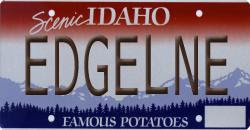Recently, from an article in Newsweek, I read about Xerox and magic.
Magic Paper. To be precise - ultraviolet light paper.
Sophie Vanderbroek, who I wrote of back in May, presents this paper by writing an 'x' with an ultraviolet light pen and the 'x' appears - then she heats the paper with a hair dryer and the 'x' dissolves; just like the old Xerox logo...
It's another effort by Xerox to someday help people conserve paper because the Magic Paper is reusable.
Says Sophie, ""We're the company that created information overload," For years everyone one has talked about the paperless office,but as most of us know, consumption of paper has increased 40 percent. "We're looking for radical solutions [by] asking ourselves, 'What does it mean to be radically green?' " Vandebroek says.
Here's the "411" on the technology behind the Magic Paper -
"The paper developed by Xerox includes photochromic compounds (such as spiropyran) which exhibit heliochromic properties. That is, they darken when exposed to U.V. radiation and fade in the absence of U.V. light. Photochromic compounds are used in the manufacturing of certain sunglasses due to their ability to darken and regain their transparency quickly. However, a distinct difference from sunglasses is that Xerox’s erasable paper can remain darkened for many hours. The U.V. light source, called a light bar, is integrated into a printer which illuminates specific parts of the erasable paper, creating the desired text or image on the paper. The printer can also erase the paper using a different wavelength—making the paper reusable..."
It's all About the Molecules -
The paper contains specially-coded molecules that create a print after being exposed to ultraviolet light emitted from a thin bar in a printer. The molecule readjusts itself within 24 hours to its original form to delete the print, or heat can readjust the molecule instantly. The molecule was developed by Xerox - Agam Shah, Techworld
And It's all About Being Green to Make Green -
In an expanding effort for companies to "out green" each other it looks like all things business can be "Greenified" - and all green projects will save money.
From the Newsweek article -
"Some of the savings arise from pretty simple stuff. Instead of giving each worker a desktop printer, for example, companies can consolidate and use networked printers. They'll install multifunction machines that can replace separate printers, copiers and fax machines. Another trick: create a print-on-demand system for brochures, forms and other corporate literature, to avoid printing up thousands of copies and storing them until they are needed—or thrown out when they're not. Owens Corning outsourced its print operations to Xerox and saved $1.5 million a year by adopting a print-on-demand strategy. Its system now lets building contractors go online to print customized brochures about Owens Corning products. That saves money for Owens Corning and also lets contractors deliver material that's tailored to each customer..."
"I'm in a funny business—I'm looking for ways that companies can print less," says John Kelly, president of global services at Xerox. "Printing is not going to go away, but we think you have to print more efficiently, and when you do print, print stuff that's relevant. We know that if we do that we can continue to grow."
And Wall Street agrees, "We care about how it positions them competitively, and customers are asking for it. So at the very least it's good marketing," says Shannon Cross, analyst at Cross Research, an independent stock-research firm.
The biggest reason that green solutions are popular is that they're really about saving money, says Angèle Boyd, analyst at researcher IDC. "Frankly, what the customer is benefiting from is a reduction in cost, but at the same time they get the benefit of a reduction in their carbon footprint," Boyd says.
Vandebroek says, "It's still a research project," and she is also the one who said, "...within the research and development community at Xerox, we no longer do any work on photocopiers..."

